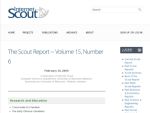In response to a lawsuit filed by the Associated Press, artist Shepard Fairey countersues
Artist Files Lawsuit Against the Associated Press Over Image of Obama
http://www.nytimes.com/2009/02/10/arts/design/10fair.html
Fair Use Project Files Suit Against The Associated Press on Behalf of Artist Shepard Fairey [pdf]
http://cyberlaw.stanford.edu/node/6061
Artist questions police's timing of his arrest on graffiti charges
http://www.boston.com/ae/theater_arts/articles/2009/02/10/cultural_acclaim_residents_anger/
Lawrence Lessig: Remix
http://fora.tv/2009/01/14/Lawrence_Lessig_Remix#chapter_01
Banned in Boston
http://www.bu.edu/library/guides/boston/banned.html
Obey Giant [Macromedia Flash Player]
http://obeygiant.com/
Last Friday, contemporary artist Shepard Fairey was in Boston to celebrate the opening of his new gallery show at the Institute of Contemporary Art. He was probably not expecting to get arrested by the Boston Police Department, but that was exactly what happened on his way to the Institute's home in the Fort Point Channel neighborhood. Fairey was arrested on graffiti-related charges, and he later pled not guilty. It was the end of a busy week for Fairey, as The Associated Press sued him on Thursday for copyright infringement. The Associated Press (AP) has made the claim that he appropriated a 2006 AP photograph taken by Mannie Garcia for his iconic "Hope" poster, which became a popular image during President Barack Obama's campaign for president. This Monday, Fairey countersued the Associated Press, asking a judge to declare that he is in fact protected from copyright infringement claims as regards his use of the photo in question. The whole situation gets a bit more complicated as Garcia has recently stated he holds the copyright for the photograph. It remains to be seen how things will turn out for all the parties involved, but in a recent interview Garcia remarked, "I don't condone people taking things, just because they can, off the Internet. But in this case I think it's a very unique question."
The first link will take readers to an article from this Tuesday's New York Times which talks about Fairey's current situation and the countersuit he recently filed against the AP. The second link leads to the text of the suit filed against the AP in support of Fairey's case by the Fair Use Project at Stanford University's Center for Internet and Society. The third link will take users to an article from this Tuesday's Boston Globe. The article takes a look at both Fairey's arrest and the reaction of Boston residents to his art. Moving on, the fourth link leads to a talk by Professor Lawrence Lessig on how copyright law might be transformed and modified for the 21st century. The fifth link leads to a delightful list from the Boston University Libraries about things that have been "banned in Boston" during the past several centuries. While Fairey's work wasn't banned per se, many other things have not been so lucky, including plays, pamphlets, and books like Theodore Dreiser's "An American Tragedy". The final link will take users to Fairey's own homepage, where they can view some of his works and learn more about his background.
Archived Scout Publication URL
Scout Publication
Creator
Publisher
GEM Subject
Date Issued
February 13th, 2009
Data Type
Required Software
Language
Date of Scout Publication
February 13th, 2009
Resource URL Clicks
1
Internal
Cumulative Rating
0
Resources




Comments